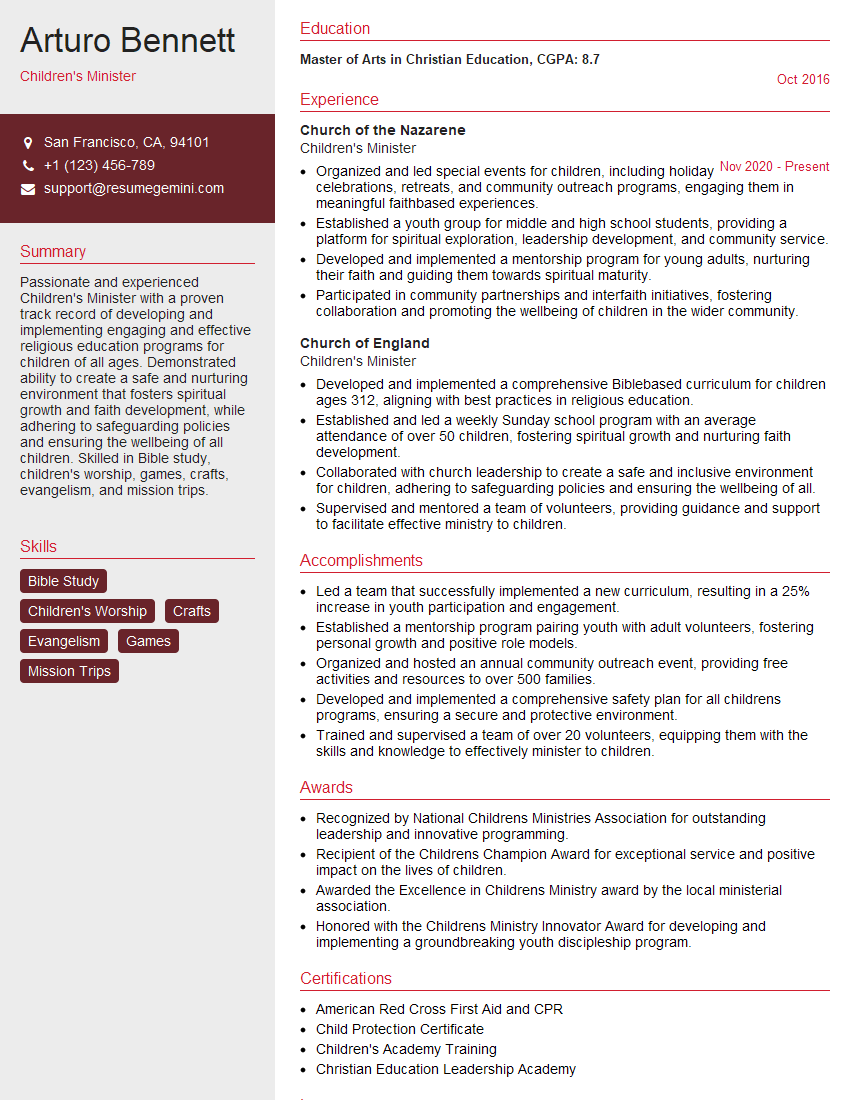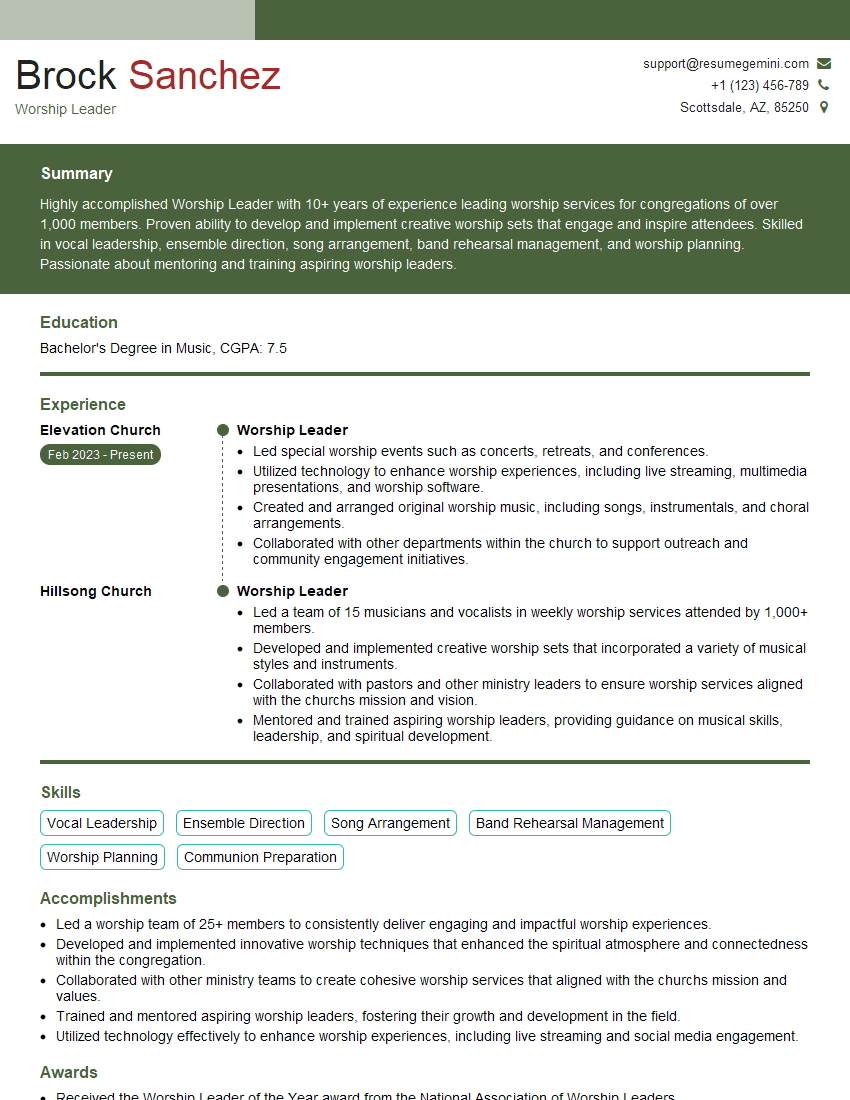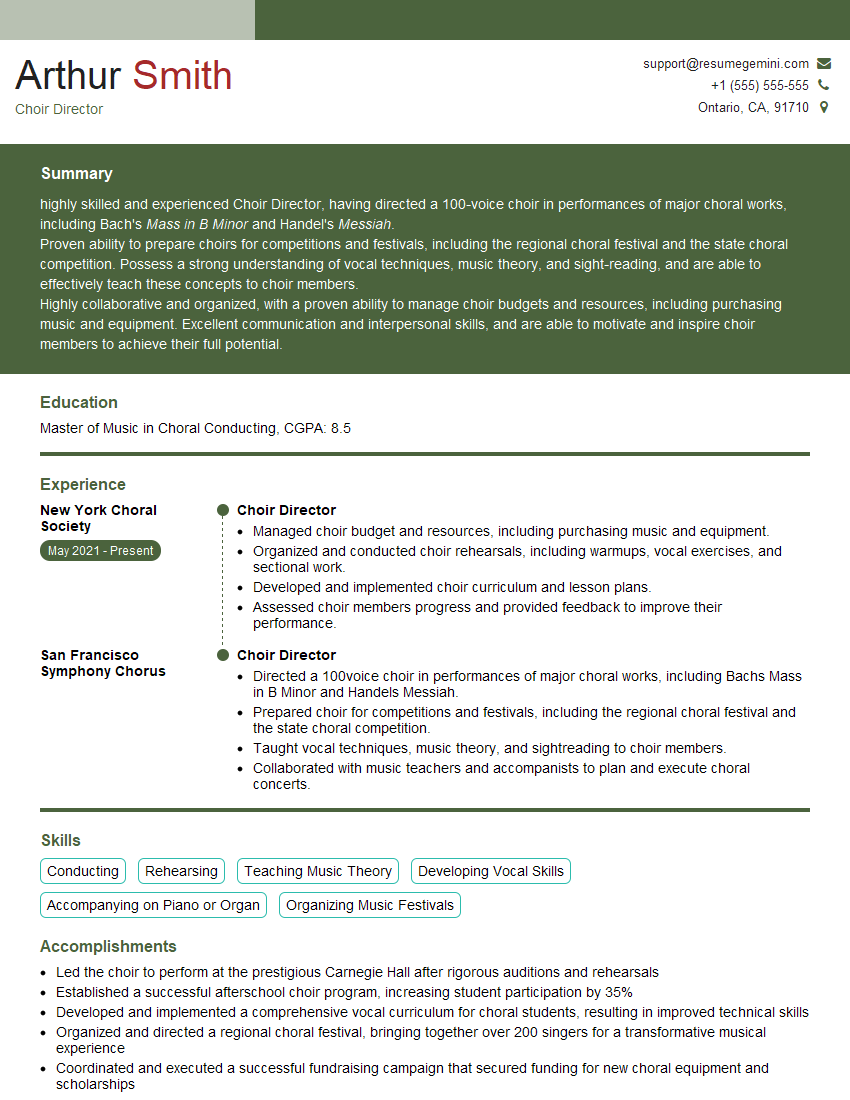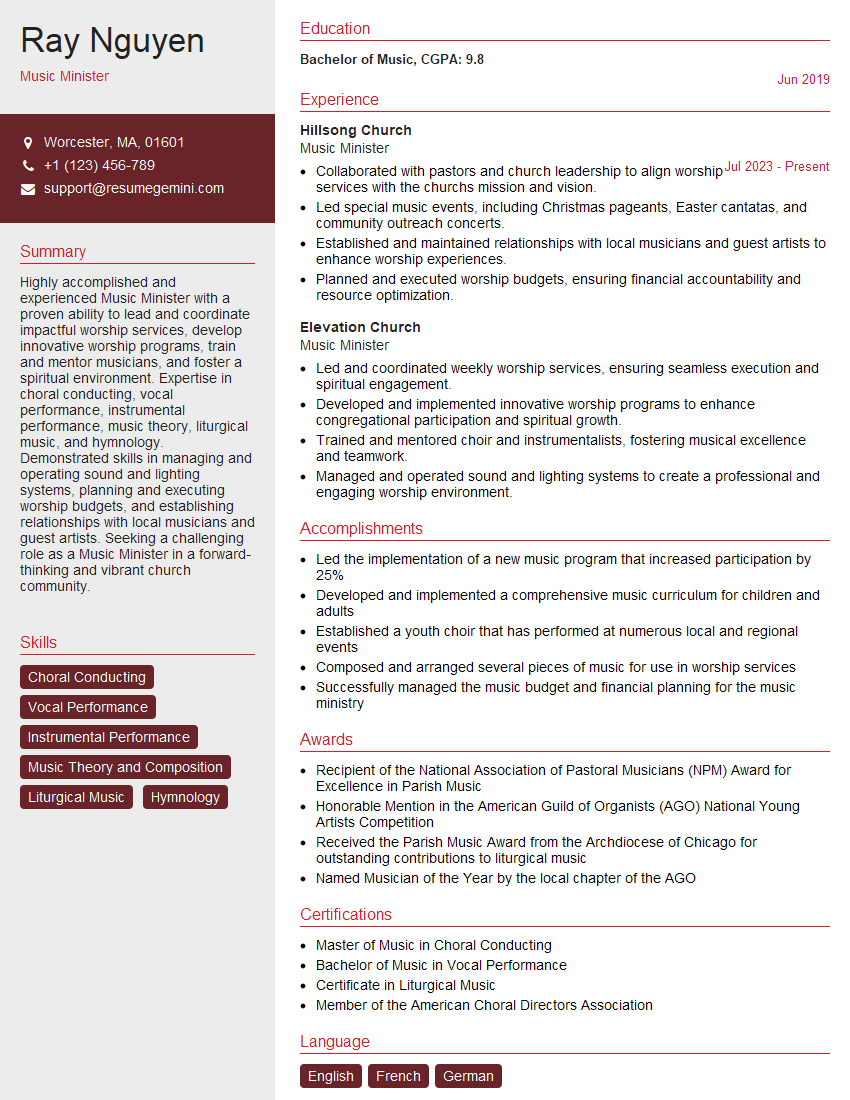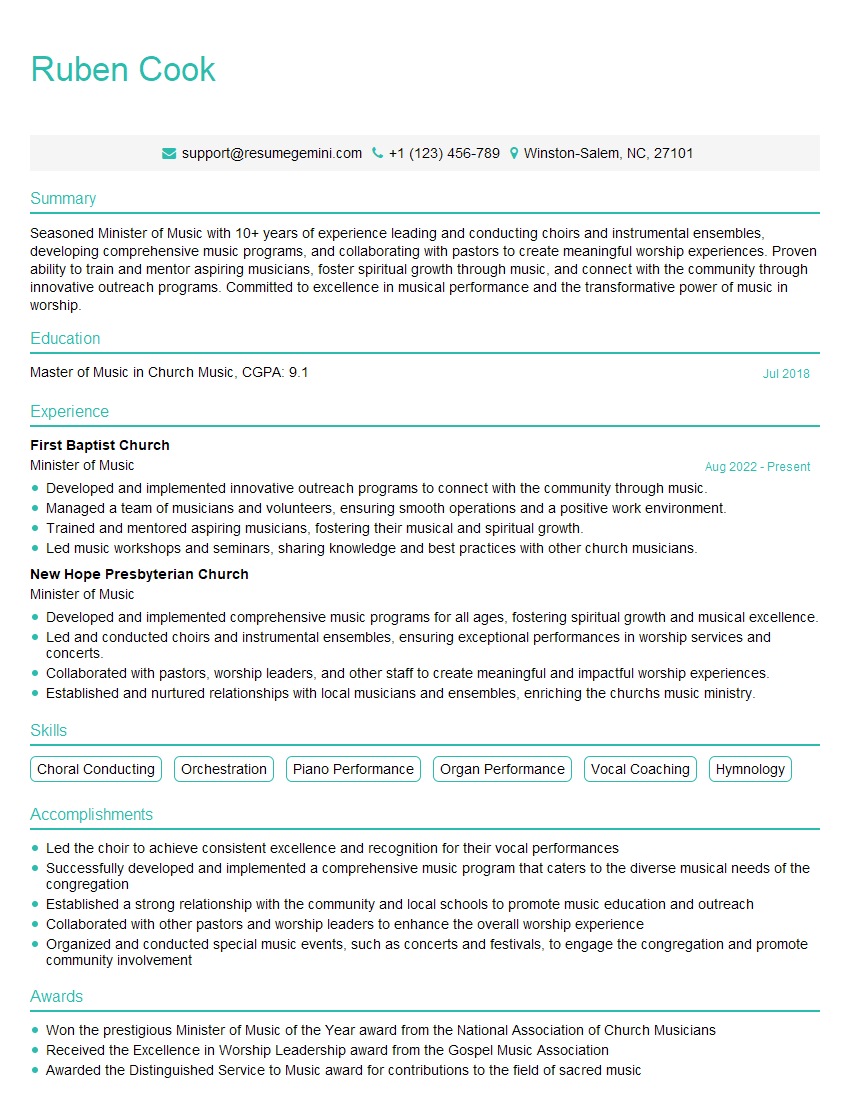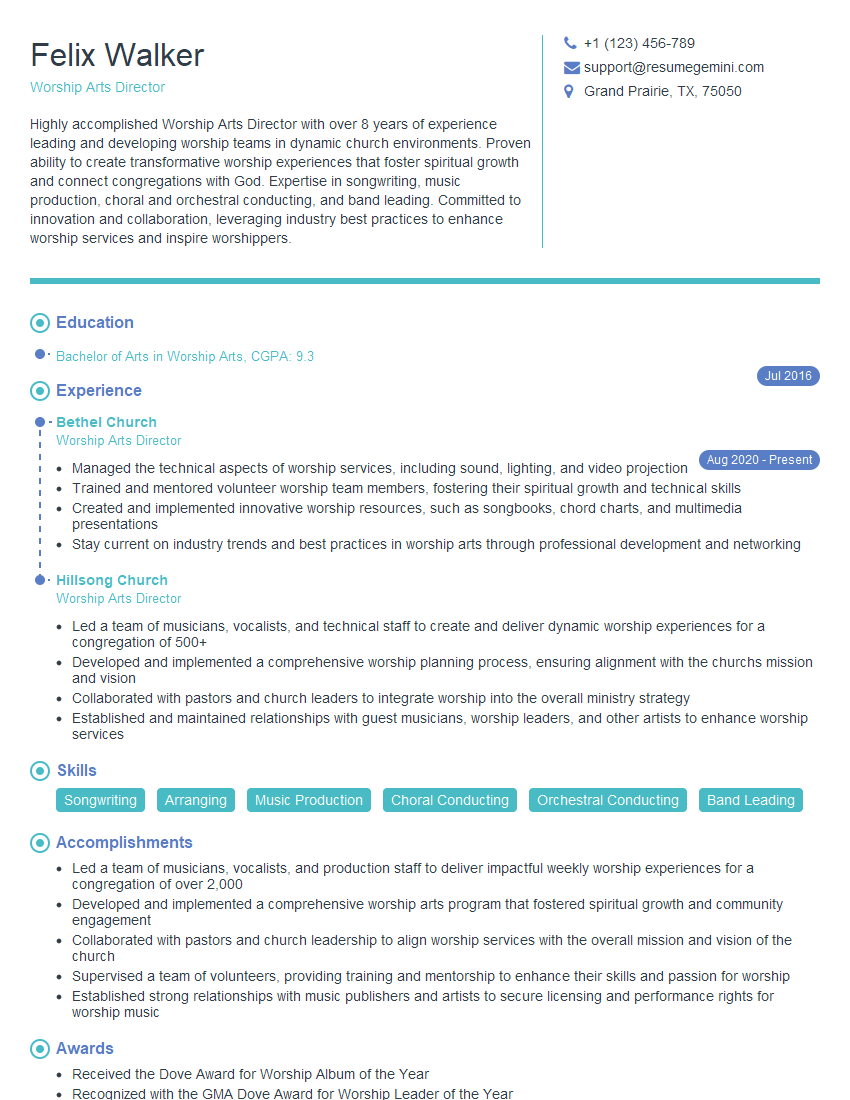Every successful interview starts with knowing what to expect. In this blog, we’ll take you through the top Worship Leading and Ministry interview questions, breaking them down with expert tips to help you deliver impactful answers. Step into your next interview fully prepared and ready to succeed.
Questions Asked in Worship Leading and Ministry Interview
Q 1. Describe your experience leading congregational worship.
My experience in leading congregational worship spans over 15 years, encompassing diverse settings from small intimate gatherings to large multi-ethnic congregations. I’ve led worship in traditional, contemporary, and blended styles, adapting my approach to resonate with the specific needs and preferences of each community. This has involved not only leading the music but also crafting a holistic worship experience that integrates prayer, scripture reading, and preaching into a unified and meaningful whole. For example, in one congregation, I developed a series of themed worship services that explored various biblical themes through a combination of traditional hymns and contemporary songs, resulting in increased congregational engagement and a deeper understanding of the scripture. In another, I worked to create a more inclusive and accessible worship experience for individuals with disabilities, incorporating sign language interpreters and tactile elements.
Q 2. How do you select appropriate music for different services and occasions?
Selecting appropriate music is a crucial aspect of effective worship leading. My approach is multifaceted and considers several key factors: the liturgical calendar (e.g., Advent, Lent, Easter), the specific theme of the service, the demographic makeup of the congregation, and the overall tone that I want to establish. I strive for balance, blending songs of praise, worship, confession, and reflection. For instance, during a service focused on healing, I might select songs that express vulnerability, hope, and God’s unwavering love. For a celebratory occasion, upbeat and joyful music would take precedence. I always review the lyrical content carefully, ensuring theological accuracy and relevance to the message. Additionally, I collaborate with the worship team to gauge their comfort level and musical capabilities.
Q 3. Explain your approach to incorporating contemporary and traditional elements in worship.
Incorporating both contemporary and traditional elements in worship is key to creating an inclusive and engaging experience for a diverse congregation. My approach prioritizes thoughtful integration rather than a jarring juxtaposition. I often blend contemporary praise songs with traditional hymns, perhaps using a contemporary arrangement of a classic hymn or vice versa. This approach helps bridge the generational gap and allows for a richer musical tapestry. For example, I might start the service with a traditional hymn familiar to older generations, followed by a contemporary song that speaks to younger members, then transition back to a traditional gospel song that unites the congregation through shared heritage. The goal is to create a flow that feels natural and meaningful, rather than a forced or contrived mix.
Q 4. How do you manage and train a worship team?
Managing and training a worship team requires strong leadership, clear communication, and a focus on fostering both individual growth and team cohesion. I begin by establishing clear expectations, outlining roles and responsibilities, and providing consistent feedback. Regular rehearsals are crucial for practicing songs, coordinating transitions, and building musical synergy. I encourage individual members to develop their talents through mentoring and opportunities for leadership within the team. This includes providing constructive criticism, celebrating successes, and fostering a supportive environment where everyone feels valued and empowered. Conflict resolution is also important; I proactively address disagreements and foster open communication to maintain a positive and productive team dynamic.
Q 5. How do you handle technical difficulties during a service?
Technical difficulties are inevitable, but a well-prepared worship leader can minimize their impact. My approach is threefold: prevention, preparedness, and grace. Prevention involves rigorous pre-service checks of all equipment, sound levels, and lighting. Preparedness means having backup plans, including alternative songs or a simplified format ready to deploy if necessary. Grace involves remaining calm and reassuring the congregation during glitches; I might address the situation with a simple, lighthearted comment, or I might seamlessly transition into a quieter moment of prayer or reflection while the problem is being addressed. The goal is to maintain the worship flow and avoid disrupting the spiritual experience.
Q 6. Describe your experience with sound reinforcement and audio-visual technology.
I possess extensive experience with sound reinforcement and audio-visual technology, encompassing sound system operation, microphone techniques, lighting design, and projection systems. I’m proficient in using various audio mixing consoles and digital audio workstations (DAWs). My understanding extends beyond basic operation to include optimizing sound quality, troubleshooting technical issues, and creating a visually appealing and engaging worship environment through lighting and projections. For instance, I have experience using lighting to emphasize specific moments during the service, such as the reading of scripture or communion. I am also adept at utilizing projection systems to display lyrics, announcements, and visual aids that enhance the worship experience.
Q 7. How do you create a welcoming and inclusive atmosphere during worship?
Creating a welcoming and inclusive atmosphere is paramount. I strive to communicate genuine warmth and hospitality through my interactions both on and off stage. I use inclusive language in my announcements and prayers and ensure that everyone feels seen, heard, and valued. Accessibility is a key consideration; I work to make worship accessible to individuals with disabilities through appropriate accommodations. Furthermore, I prioritize diversity in musical styles and song selection to reflect the multicultural nature of the congregation. I also encourage interaction and participation, creating opportunities for congregants to share their gifts and testimonies. Ultimately, the goal is to foster a sense of belonging and community where all feel loved and accepted in God’s presence.
Q 8. How do you incorporate prayer and scripture into your worship services?
Prayer and Scripture are the very foundation of our worship services. They aren’t merely add-ons; they are the heart and soul of our time together. We incorporate them in several ways. First, we begin with a time of corporate prayer, often led by different members of the congregation, fostering a sense of shared intimacy with God. This prayer isn’t just a recitation; it’s a heartfelt expression of needs, thanksgivings, and petitions relevant to our community and the world. Second, Scripture readings are carefully selected to complement the sermon’s theme, providing a rich theological context and resonating with the congregation’s current spiritual journey. We often use responsive readings, engaging the congregation actively in the Word. Finally, we weave scripture into the songs we sing, choosing hymns and contemporary worship music with biblically based lyrics. This ensures that our music isn’t just entertainment but a powerful vehicle for spiritual truth. For example, a service centered on forgiveness might incorporate Psalm 51 and songs that focus on grace and redemption.
Q 9. What is your philosophy regarding contemporary vs. traditional worship styles?
My philosophy regarding contemporary vs. traditional worship styles is one of inclusivity and balance. I believe both styles offer unique strengths that can enrich the overall worship experience. Traditional hymns often possess profound theological depth and historical resonance, connecting us to the rich tapestry of Christian faith across generations. Contemporary worship, on the other hand, often speaks a language more readily understood by younger generations, using current musical styles to express heartfelt faith. Rather than seeing them as opposing forces, I strive to create a blended approach that honors both traditions, allowing for a diverse and engaging worship experience for all age groups and spiritual backgrounds. This might involve incorporating a mix of traditional hymns and contemporary songs, ensuring the music reflects a variety of tempos and styles, thereby creating a dynamic worship service that resonates deeply with everyone present.
Q 10. How do you foster spiritual growth within your worship team?
Fostering spiritual growth within my worship team is paramount. We achieve this through several key initiatives. Firstly, regular team meetings aren’t solely about logistical planning; we dedicate time for personal sharing, prayer, and spiritual reflection, creating a safe space for vulnerability and mutual support. Secondly, we encourage personal Bible study and mentorship within the team. Experienced members guide newer members, fostering a culture of learning and growth. Thirdly, we participate in ongoing professional development opportunities, attending workshops, conferences, and seminars to sharpen musical skills and deepen our understanding of worship leadership. Finally, we prioritize accountability and mutual encouragement. This involves consistent feedback, honest conversations, and a commitment to personal spiritual disciplines, ensuring that the team’s growth is both musical and spiritual.
Q 11. Describe your experience working with volunteers in a ministry setting.
Working with volunteers in ministry requires a blend of clear communication, appreciation, and effective delegation. I’ve found that fostering a strong sense of community and shared purpose is crucial. This starts with clear expectations laid out upfront – describing roles, responsibilities, and timelines. Regular training and support are vital, ensuring volunteers feel equipped and confident in their roles. Recognition and appreciation are equally important; celebrating their contributions, big or small, reinforces their commitment and sense of value within the team. We also focus on creating a culture of open communication, where volunteers feel comfortable sharing feedback, concerns, and ideas. For instance, I had a volunteer who struggled with a specific technical aspect of sound engineering. By providing additional training and one-on-one mentorship, we overcame the challenge, and the volunteer not only improved but became a valuable asset to the team.
Q 12. How do you balance the needs of the congregation with the artistic vision for worship?
Balancing the needs of the congregation with the artistic vision for worship is a delicate but crucial task. It’s not a matter of choosing one over the other; rather, it’s about integrating both harmoniously. I begin by actively listening to the congregation’s feedback, understanding their preferences, and identifying areas where they connect most strongly with worship. This involves conducting surveys, holding focus groups, or simply engaging in informal conversations. Once this understanding is established, I work to create a worship plan that reflects both the spiritual needs of the community and the artistic integrity of the service. This might involve selecting music that resonates with the congregation’s spiritual maturity while still maintaining a creative and engaging flow. It’s an ongoing process of careful discernment, seeking God’s guidance and responsiveness to the needs of his people.
Q 13. How do you handle conflicts or disagreements within the worship team?
Handling conflicts or disagreements within the worship team requires a proactive and grace-filled approach. Open and honest communication is key. When a conflict arises, I facilitate a safe and respectful space for the individuals involved to share their perspectives. I actively listen to each person without interrupting, ensuring everyone feels heard and understood. Then, I guide the team toward a collaborative solution, focusing on finding common ground and resolving the issue in a way that honors each person’s contribution and values. Confidentiality is paramount; I strive to resolve conflict within the team without involving outside parties unless absolutely necessary. If the issue is deeply rooted or unresolved, I may seek guidance from a pastoral leader or conflict resolution specialist. Ultimately, my goal is to heal the team, preserve unity, and restore a spirit of collaboration.
Q 14. Describe your experience in planning and executing special worship events.
Planning and executing special worship events, such as Christmas services or Easter celebrations, requires meticulous attention to detail and thoughtful planning. I start by defining clear goals and objectives for the event, determining the desired atmosphere and spiritual message. Then, I build a team of volunteers with complementary skills, assigning roles and responsibilities accordingly. We brainstorm creative ideas, considering all aspects, from music selection and sermon content to lighting, decorations, and technical aspects. Thorough rehearsals are essential, ensuring seamless transitions and a polished performance. Furthermore, I develop a detailed timeline, ensuring tasks are completed efficiently and effectively. Effective communication is vital, keeping volunteers informed and updated throughout the planning and execution phases. Post-event evaluation is crucial, analyzing successes and areas for improvement, informing future events. For example, our Easter sunrise service involved coordinating a large team, securing a unique outdoor location, and organizing logistics for attendees. The event was a powerful success, demonstrating the benefits of meticulous planning and team collaboration.
Q 15. What software or technology are you proficient in for music arrangement and production?
My proficiency in music arrangement and production software spans several platforms. I’m highly skilled in using Logic Pro X for its robust MIDI editing capabilities, extensive virtual instrument library, and powerful mixing and mastering tools. I regularly use Ableton Live for its intuitive workflow, ideal for live looping and creating dynamic worship arrangements. For simpler tasks or quick edits, I also utilize GarageBand, which offers a user-friendly interface without sacrificing quality. Furthermore, I’m familiar with notation software like Sibelius, crucial for creating accurate scores and charts for the worship team. My experience extends to audio editing software like Audacity for basic audio cleanup and manipulation. Each program serves a specific purpose in my workflow, allowing me to efficiently create and refine high-quality worship music.
Career Expert Tips:
- Ace those interviews! Prepare effectively by reviewing the Top 50 Most Common Interview Questions on ResumeGemini.
- Navigate your job search with confidence! Explore a wide range of Career Tips on ResumeGemini. Learn about common challenges and recommendations to overcome them.
- Craft the perfect resume! Master the Art of Resume Writing with ResumeGemini’s guide. Showcase your unique qualifications and achievements effectively.
- Don’t miss out on holiday savings! Build your dream resume with ResumeGemini’s ATS optimized templates.
Q 16. Explain your understanding of copyright laws regarding church music.
Copyright law regarding church music is a complex area requiring careful consideration. Generally, using copyrighted music in a church service requires a license. CCLI (Copyright Licensing International) is a well-known organization that provides licenses for many churches to use copyrighted songs in their services, covering both public performances and reproductions. However, using music in recordings for online streaming or distribution also requires specific licenses often handled through the CCLI Streaming License. Public domain music, or music with expired copyrights, can be used freely. It’s crucial to understand that simply because a song is available online doesn’t automatically mean it’s free to use. Always check the copyright information and obtain necessary licenses to avoid legal issues and support songwriters. Ignoring copyright law can lead to expensive fines and legal battles. Transparency and responsible licensing practices are vital.
Q 17. How do you adapt your worship style to reach diverse age groups and cultural backgrounds?
Adapting worship style to diverse age groups and cultural backgrounds is paramount to creating an inclusive and engaging experience. I achieve this through careful song selection, incorporating a variety of musical genres and tempos. For example, including traditional hymns alongside contemporary Christian music caters to older and younger generations. I might incorporate elements of different cultures, such as using instruments or musical styles associated with specific ethnic groups, to show respect and build community. Language is another key factor; translating songs or using songs in multiple languages ensures inclusivity. Visual aids, storytelling, and participatory elements, like hand actions or call-and-response sections, can further enhance engagement across age groups and cultural preferences. Ultimately, the goal is to create an environment where everyone feels welcomed, understood, and connected to God.
Q 18. How do you assess the effectiveness of your worship services?
Assessing the effectiveness of worship services involves a multi-faceted approach. I use both quantitative and qualitative methods. Quantitative methods might include attendance figures, offering contributions (although not solely a measure of spiritual impact), and feedback surveys. Qualitative methods are crucial and include observing congregation engagement during the service—are people singing, praying, and participating actively? I also listen to feedback from individuals and leaders within the congregation. Post-service conversations and informal interactions can offer valuable insights into how people felt during the service. Finally, prayerful reflection on the service is essential, seeking God’s guidance on how to improve and better serve the congregation’s spiritual needs. The goal is not just numbers but a sincere assessment of how the service fostered spiritual growth and connection.
Q 19. How do you maintain a healthy work-life balance while serving in ministry?
Maintaining a healthy work-life balance in ministry is a constant challenge but essential for long-term sustainability. It requires intentional planning and self-care. I prioritize setting boundaries, ensuring dedicated time for personal rest and rejuvenation. This includes regular time away from work, hobbies, and time with family and friends. Learning to delegate tasks and responsibilities to others within the ministry team is also crucial. This prevents burnout and allows for a more collaborative and balanced approach. Regular exercise, healthy eating, and sufficient sleep contribute to physical and mental well-being. Finally, seeking spiritual renewal through personal prayer and time with God is vital for replenishing emotional reserves and maintaining a strong sense of purpose.
Q 20. How do you integrate technology into your worship services (e.g., projection, live streaming)?
Integrating technology into worship services enhances the overall experience and expands reach. We use projection systems for displaying lyrics, song titles, and scripture verses. This increases participation by allowing everyone to easily follow along. Live streaming capabilities expand the congregation’s reach to those who are unable to attend in person, creating a virtual community. Video editing software is used to create pre-service announcements and promotional materials. For live streaming, we utilize a combination of hardware and software such as a professional video camera, audio mixer, and streaming software like OBS Studio. It’s crucial that technology serves the worship experience and not distract from it. Simple, user-friendly technology is preferred to avoid technical difficulties during the service.
Q 21. Describe your experience with developing and implementing a worship plan.
Developing and implementing a worship plan involves a collaborative and thoughtful process. It starts with understanding the overall vision and mission of the church. I work closely with the pastoral staff and worship team to identify the themes and goals for the upcoming season. This includes selecting appropriate biblical texts, choosing songs that align with the themes, and planning the overall flow of the service. This often involves brainstorming sessions and discussions to ensure everyone’s input is considered. I then create a detailed schedule outlining each element of the service, including songs, prayers, readings, and announcements. Finally, we rehearse and refine the plan to ensure a smooth and effective service, consistently seeking feedback and adapting as needed. A well-planned worship service is not rigid but flexible, allowing for the Spirit’s guidance and spontaneous moments of worship.
Q 22. How do you communicate effectively with church leadership and staff?
Effective communication with church leadership and staff is paramount for a successful worship ministry. My approach is built on transparency, proactive updates, and open dialogue. I believe in fostering a culture of mutual respect and collaboration. This involves regular meetings, both formal and informal, to discuss upcoming services, logistical needs, and ministry goals. I prioritize clear and concise communication, utilizing various methods such as email updates for schedule changes, in-person meetings for strategy sessions, and one-on-one check-ins to address individual concerns. For example, before a major event like a Christmas Eve service, I’d present a detailed plan outlining the music selection, team assignments, technical requirements, and potential challenges, seeking feedback and input from all stakeholders. This ensures everyone is informed and feels valued in the process. Furthermore, I actively solicit feedback and suggestions, creating a safe space for honest conversation and problem-solving.
Q 23. What are your strengths and weaknesses in leading worship?
My strengths lie in creating a deeply spiritual and engaging worship experience. I’m skilled at selecting music that resonates with the congregation, fostering a sense of community and participation. I also excel at adapting to different styles and preferences, ensuring the worship is relevant and meaningful. I am comfortable leading both large and intimate gatherings. My experience in team building and mentoring enables me to cultivate a collaborative and supportive environment among musicians and tech staff. However, my weakness is sometimes struggling to delegate effectively. I tend to be hands-on in every aspect of the preparation, which can lead to burnout. I’m actively working on this by developing better delegation skills and learning to trust my team members’ abilities more fully. I’ve started using project management tools to better assign tasks and monitor progress.
Q 24. How do you handle constructive criticism and feedback?
I view constructive criticism as an invaluable tool for growth. I actively seek feedback from various sources, including leadership, team members, and even congregants. My approach involves listening attentively, asking clarifying questions to understand the perspective, and reflecting on the feedback without defensiveness. I believe in separating the message from the messenger, focusing on the intent behind the criticism rather than getting caught up in emotions. For example, if someone critiques my song selection as too repetitive, I would analyze the feedback, consider their reasoning, and explore how to diversify the music in future services. I view feedback as an opportunity to learn and improve, refining my ministry practices to better serve the needs of the congregation.
Q 25. What is your approach to managing the budget for worship ministry?
Managing the worship ministry budget requires careful planning and transparency. My approach begins with developing a detailed budget proposal, outlining anticipated expenses (such as music licensing, equipment maintenance, instrument repairs, and musician honorariums) and projected income (through tithes, offerings, and fundraising). This proposal is then presented to church leadership for review and approval. I prioritize cost-effective solutions, exploring options like renting equipment instead of purchasing it when possible. I regularly track expenses and reconcile accounts, ensuring adherence to the approved budget. Any significant deviations from the plan are promptly communicated to church leadership. I strive for transparency by making budget information readily available to team members, fostering a sense of shared responsibility in resource management.
Q 26. Describe a time you had to resolve a conflict between members of your worship team.
In one instance, a disagreement arose between our lead guitarist and keyboardist regarding song arrangements. Both were passionate and talented musicians, but their creative visions clashed, affecting team cohesion and potentially the quality of the worship experience. My approach involved facilitating a mediated conversation, creating a safe and respectful environment for them to express their concerns. I actively listened to each individual’s perspective, emphasizing the shared goal of delivering impactful worship. I then guided them in finding common ground, exploring compromises that honored both their musical styles. This included assigning specific songs to each musician where their individual style could be prominently featured and collaboratively arranging other songs that incorporated elements from both their suggestions. Ultimately, the conflict resolution strengthened the team dynamic, fostering a greater appreciation for each other’s strengths and a more collaborative approach to music arrangement.
Q 27. How do you measure the success of a worship service?
Measuring the success of a worship service goes beyond simply counting attendance. While attendance is a factor, I look for qualitative indicators of engagement and spiritual impact. This includes observing the level of participation in singing, prayer, and overall atmosphere. Post-service feedback, whether through informal conversations or structured surveys, provides valuable insights. Increased congregational participation in other church activities can also be an indicator of a successful service, suggesting that the worship experience fostered a greater sense of connection and belonging. For example, if I see an increase in people joining small groups or volunteering after a particularly moving service, I consider that a significant success. Finally, personal testimonies from congregants sharing how the worship impacted them are powerful indicators of the service’s effectiveness.
Q 28. What are your long-term goals for your ministry career?
My long-term goals involve developing into a seasoned worship leader who can effectively mentor and train others. I aspire to create and implement innovative worship formats that engage a wider audience and encourage deeper spiritual connection. I also plan to contribute to the wider worship community through writing, teaching, and leading workshops. This would involve sharing my experience and knowledge to equip and inspire other worship leaders. I am passionate about using my gifts to build strong, thriving worship communities that glorify God and transform lives. Ultimately, my aim is to leave a lasting legacy of impactful worship that has inspired generations to come.
Key Topics to Learn for Worship Leading and Ministry Interview
- Biblical Foundations of Worship: Understanding the theological basis of worship, different worship styles across cultures and traditions, and the historical development of liturgical practices.
- Leading Congregational Song: Practical skills in vocal technique, leading congregational singing effectively, choosing appropriate songs for diverse congregations, and managing song selection processes.
- Teamwork and Collaboration: Working effectively with musicians, tech teams, pastors, and other ministry leaders; understanding collaborative leadership styles and conflict resolution strategies within a worship team.
- Spiritual Formation and Discipleship: Integrating spiritual disciplines into personal life and ministry; fostering spiritual growth within the congregation through worship; leading and guiding others spiritually.
- Planning and Preparation: Developing and implementing worship plans; selecting appropriate scripture readings and prayers; managing the logistical aspects of worship services (e.g., sound, lighting, etc.).
- Communication and Pastoral Care: Communicating effectively with the congregation, offering pastoral care and support, and creating a welcoming and inclusive worship environment.
- Technology and Media in Worship: Utilizing technology effectively in worship services; understanding the role of media (projections, videos, etc.) in enhancing worship experiences.
- Music Theory and Practical Musicianship (if applicable): Demonstrating a foundational understanding of music theory and practical application in leading music, arranging, or playing instruments.
- Addressing Challenges and Problem-Solving: Developing strategies for managing unexpected issues during worship services (e.g., technical difficulties, unexpected absences); thinking creatively to adapt to changing circumstances.
Next Steps
Mastering Worship Leading and Ministry is crucial for impactful service and career advancement within the church. A strong resume is your first impression. An ATS-friendly resume, optimized for applicant tracking systems, significantly increases your chances of landing an interview. ResumeGemini is a trusted resource to help you build a professional and impactful resume that showcases your skills and experience effectively. Examples of resumes tailored to Worship Leading and Ministry positions are available to guide you.
Explore more articles
Users Rating of Our Blogs
Share Your Experience
We value your feedback! Please rate our content and share your thoughts (optional).
What Readers Say About Our Blog
Hello,
We found issues with your domain’s email setup that may be sending your messages to spam or blocking them completely. InboxShield Mini shows you how to fix it in minutes — no tech skills required.
Scan your domain now for details: https://inboxshield-mini.com/
— Adam @ InboxShield Mini
Reply STOP to unsubscribe
Hi, are you owner of interviewgemini.com? What if I told you I could help you find extra time in your schedule, reconnect with leads you didn’t even realize you missed, and bring in more “I want to work with you” conversations, without increasing your ad spend or hiring a full-time employee?
All with a flexible, budget-friendly service that could easily pay for itself. Sounds good?
Would it be nice to jump on a quick 10-minute call so I can show you exactly how we make this work?
Best,
Hapei
Marketing Director
Hey, I know you’re the owner of interviewgemini.com. I’ll be quick.
Fundraising for your business is tough and time-consuming. We make it easier by guaranteeing two private investor meetings each month, for six months. No demos, no pitch events – just direct introductions to active investors matched to your startup.
If youR17;re raising, this could help you build real momentum. Want me to send more info?
Hi, I represent an SEO company that specialises in getting you AI citations and higher rankings on Google. I’d like to offer you a 100% free SEO audit for your website. Would you be interested?
Hi, I represent an SEO company that specialises in getting you AI citations and higher rankings on Google. I’d like to offer you a 100% free SEO audit for your website. Would you be interested?
good
